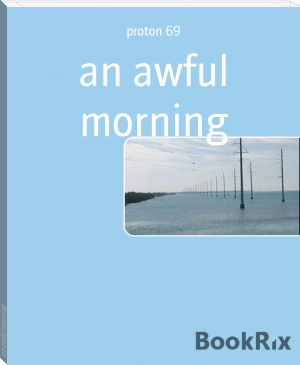Literary Lapses by Stephen Leacock (ebook reader online TXT) 📗

- Author: Stephen Leacock
Book online «Literary Lapses by Stephen Leacock (ebook reader online TXT) 📗». Author Stephen Leacock
It was passed to him.
"Have I your permission to put it into this mortar and pound it to pieces?" he asked savagely.
The Quick Man nodded and smiled.
The conjurer threw the watch into the mortar and grasped a sledge hammer from the table. There was a sound of violent smashing, "He's-slipped-it-up-his-sleeve," whispered the Quick Man.
"Now, sir," continued the conjurer, "will you allow me to take your handkerchief and punch holes in it? Thank you. You see, ladies and gentlemen, there is no deception; the holes are visible to the eye."
The face of the Quick Man beamed. This time the real mystery of the thing fascinated him.
"And now, sir, will you kindly pass me your silk hat and allow me to dance on it? Thank you."
The conjurer made a few rapid passes with his feet and exhibited the hat crushed beyond recognition.
"And will you now, sir, take off your celluloid collar and permit me to burn it in the candle? Thank you, sir. And will you allow me to smash your spectacles for you with my hammer? Thank you."
By this time the features of the Quick Man were assuming a puzzled expression. "This thing beats me," he whispered, "I don't see through it a bit."
There was a great hush upon the audience. Then the conjurer drew himself up to his full height and, with a withering look at the Quick Man, he concluded:
"Ladies and gentlemen, you will observe that I have, with this gentleman's permission, broken his watch, burnt his collar, smashed his spectacles, and danced on his hat. If he will give me the further permission to paint green stripes on his overcoat, or to tie his suspenders in a knot, I shall be delighted to entertain you. If not, the performance is at an end."
And amid a glorious burst of music from the orchestra the curtain fell, and the audience dispersed, convinced that there are some tricks, at any rate, that are not done up the conjurer's sleeve.
Hints to Travellers
The following hints and observations have occurred to me during a recent trip across the continent: they are written in no spirit of complaint against existing railroad methods, but merely in the hope that they may prove useful to those who travel, like myself, in a spirit of meek, observant ignorance.
1. Sleeping in a Pullman car presents some difficulties to the novice. Care should be taken to allay all sense of danger. The frequent whistling of the engine during the night is apt to be a source of alarm. Find out, therefore, before travelling, the meaning of the various whistles. One means "station," two, "railroad crossing," and so on. Five whistles, short and rapid, mean sudden danger. When you hear whistles in the night, sit up smartly in your bunk and count them. Should they reach five, draw on your trousers over your pyjamas and leave the train instantly. As a further precaution against accident, sleep with the feet towards the engine if you prefer to have the feet crushed, or with the head towards the engine, if you think it best to have the head crushed. In making this decision try to be as unselfish as possible. If indifferent, sleep crosswise with the head hanging over into the aisle.
2. I have devoted some thought to the proper method of changing trains. The system which I have observed to be the most popular with travellers of my own class, is something as follows: Suppose that you have been told on leaving New York that you are to change at Kansas City. The evening before approaching Kansas City, stop the conductor in the aisle of the car (you can do this best by putting out your foot and tripping him), and say politely, "Do I change at Kansas City?" He says "Yes." Very good. Don't believe him. On going into the dining-car for supper, take a negro aside and put it to him as a personal matter between a white man and a black, whether he thinks you ought to change at Kansas City. Don't be satisfied with this. In the course of the evening pass through the entire train from time to time, and say to people casually, "Oh, can you tell me if I change at Kansas City?" Ask the conductor about it a few more times in the evening: a repetition of the question will ensure pleasant relations with him. Before falling asleep watch for his passage and ask him through the curtains of your berth, "Oh, by the way, did you say I changed at Kansas City?" If he refuses to stop, hook him by the neck with your walking-stick, and draw him gently to your bedside. In the morning when the train stops and a man calls, "Kansas City! All change!" approach the conductor again and say, "Is this Kansas City?" Don't be discouraged at his answer. Pick yourself up and go to the other end of the car and say to the brakesman, "Do you know, sir, if this is Kansas City?" Don't be too easily convinced. Remember that both brakesman and conductor may be in collusion to deceive you. Look around, therefore, for the name of the station on the signboard. Having found it, alight and ask the first man you see if this is Kansas City. He will answer, "Why, where in blank are your blank eyes? Can't you see it there, plain as blank?" When you hear language of this sort, ask no more. You are now in Kansas and this is Kansas City.
3. I have observed that it is now the practice of the conductors to stick bits of paper in the hats of the passengers. They do this, I believe, to mark which ones they like best. The device is pretty, and adds much to the scenic appearance of the car. But I notice with pain that the system is fraught with much trouble for the conductors. The task of crushing two or three passengers together, in order to reach over them and stick a ticket into the chinks of a silk skull cap is embarrassing for a conductor of refined feelings. It would be simpler if the conductor should carry a small hammer and a packet of shingle nails and nail the paid-up passenger to the back of the seat. Or better still, let the conductor carry a small pot of paint and a brush, and mark the passengers in such a way that he cannot easily mistake them. In the case of bald-headed passengers, the hats might be politely removed and red crosses painted on the craniums. This will indicate that they are bald. Through passengers might be distinguished by a complete coat of paint. In the hands of a man of taste, much might be effected by a little grouping of painted passengers and the leisure time of the conductor agreeably occupied.
4. I have observed in travelling in the West that the irregularity of railroad accidents is a fruitful cause of complaint. The frequent disappointment of the holders of accident policy tickets on western roads is leading to widespread protest. Certainly the conditions of travel in the West are altering rapidly and accidents can no longer be relied upon. This is deeply to be regretted, in so much as, apart from accidents, the tickets may be said to be practically valueless.





Comments (0)